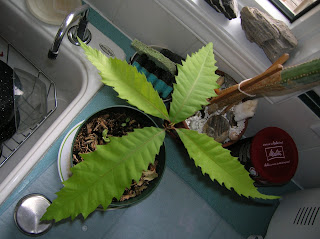I've managed to obtain some seeds for the endangered American Chestnut (Castanea dentata) species last fall, and proceeded to cold stratify some and plant some. Hopefully by spring there'll be more ... at least as houseplants.
They normally survive on the more humid regions of North America (Eastern states, including Eastern Canada). The plant was nearly wiped out as a species due to the import of Asian chestnuts lumber and plants (and their corresponding parasites, specifically the Chestnut Blight), which C.dentata has no immunity to.
Right now the seedling looks a bit tatty and leggy due to the inadequate lumens of my indoor grow light that I use to overwinter some plants .... but hey, it's kinda neat "hatching" an endangered species in your basement! Of course, I've named it Cocot, after my good friend in Ireland. The chestnut seedling is the leggy one in the middle.
The two other seedlings on either sides are sunflowers, just so I can have a measure of how "healthy" the amount of light and water (and temperature) the pot is getting.
To find out more about the American chestnut story, go read it here
Just thought I'd add a few more recent photos of the chestnut seedling now ( 20th Feb 2012). I have a few more seeds cold stratifying in the fridge and about 7 more germinating in various mediums. Planning to go looking for new places to plant them where they can be appreciated by the local fauna.
2nd of March ... getting bigger by the day. Starting to take it outside to have a bit of real sunshine.
Also starting some more chestnut seedlings ...
If you find a chestnutty looking tree in your vicinity, and are wondering if you have stumbled upon the rare species, this website will help you identify the greenling. If you're lucky, it's the rare one, and do help re-populate it in it's native land!
Identifying Chestnut species
They normally survive on the more humid regions of North America (Eastern states, including Eastern Canada). The plant was nearly wiped out as a species due to the import of Asian chestnuts lumber and plants (and their corresponding parasites, specifically the Chestnut Blight), which C.dentata has no immunity to.
Right now the seedling looks a bit tatty and leggy due to the inadequate lumens of my indoor grow light that I use to overwinter some plants .... but hey, it's kinda neat "hatching" an endangered species in your basement! Of course, I've named it Cocot, after my good friend in Ireland. The chestnut seedling is the leggy one in the middle.
The two other seedlings on either sides are sunflowers, just so I can have a measure of how "healthy" the amount of light and water (and temperature) the pot is getting.
To find out more about the American chestnut story, go read it here
Just thought I'd add a few more recent photos of the chestnut seedling now ( 20th Feb 2012). I have a few more seeds cold stratifying in the fridge and about 7 more germinating in various mediums. Planning to go looking for new places to plant them where they can be appreciated by the local fauna.
2nd of March ... getting bigger by the day. Starting to take it outside to have a bit of real sunshine.
Also starting some more chestnut seedlings ...
If you find a chestnutty looking tree in your vicinity, and are wondering if you have stumbled upon the rare species, this website will help you identify the greenling. If you're lucky, it's the rare one, and do help re-populate it in it's native land!
Identifying Chestnut species











No comments:
Post a Comment